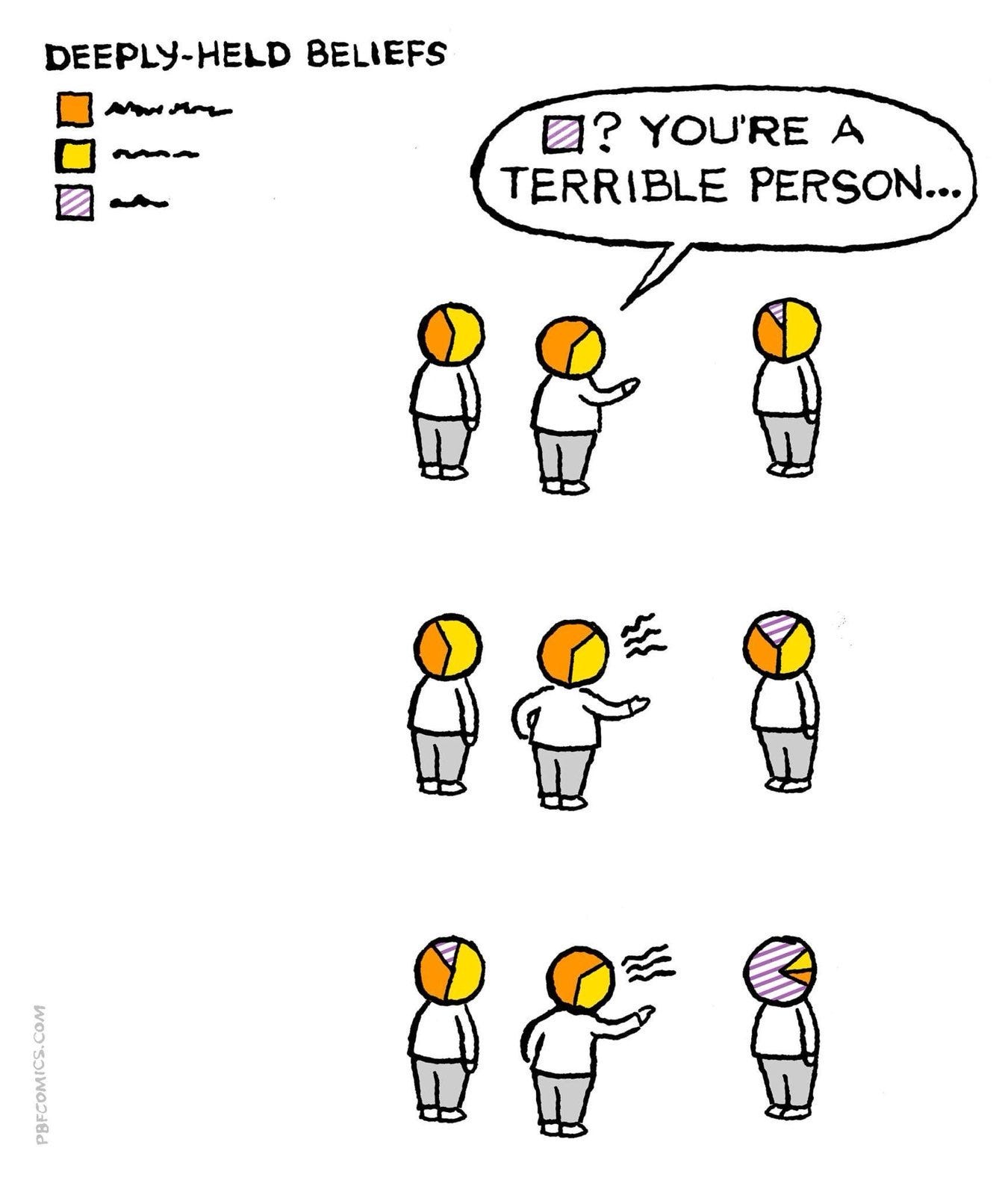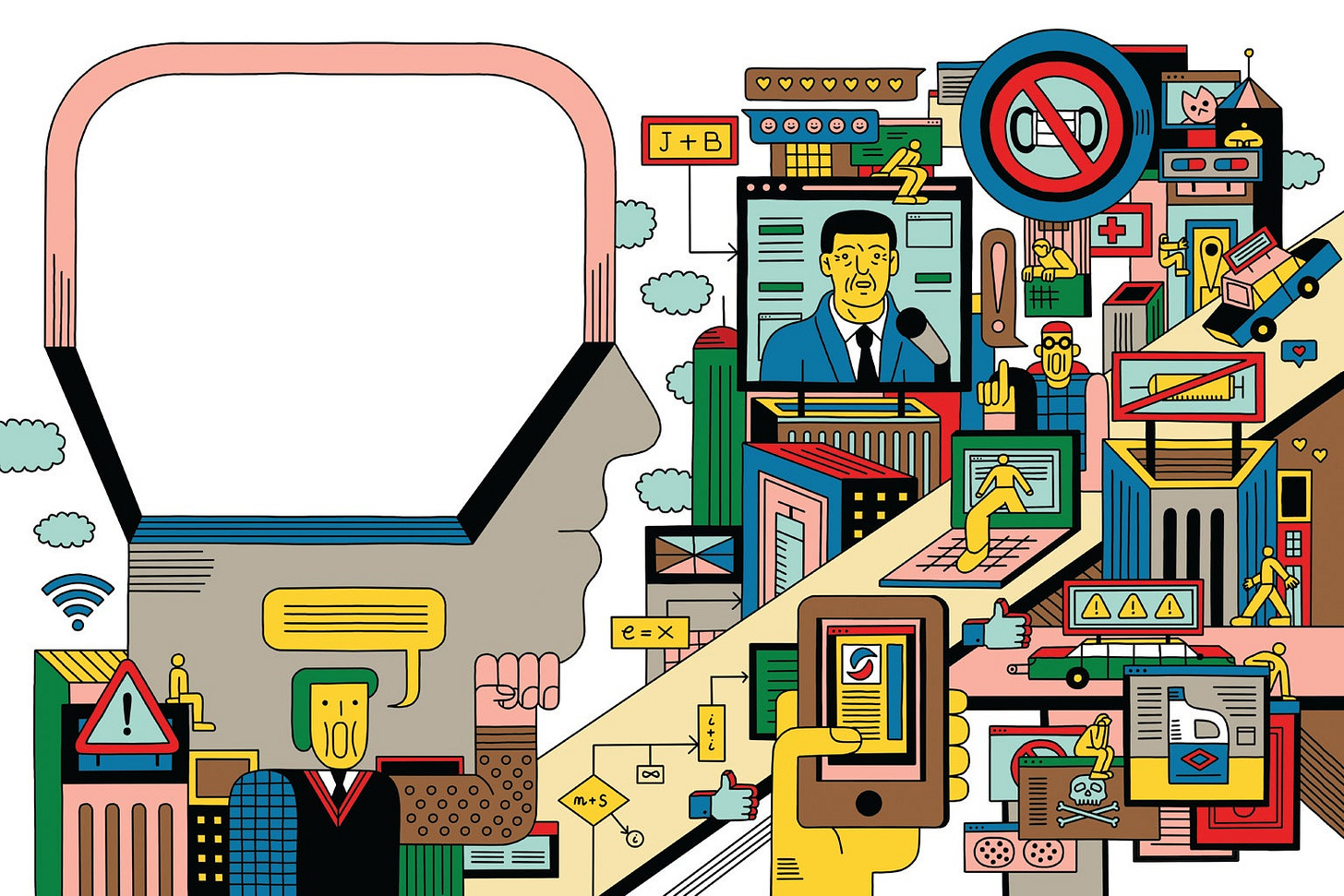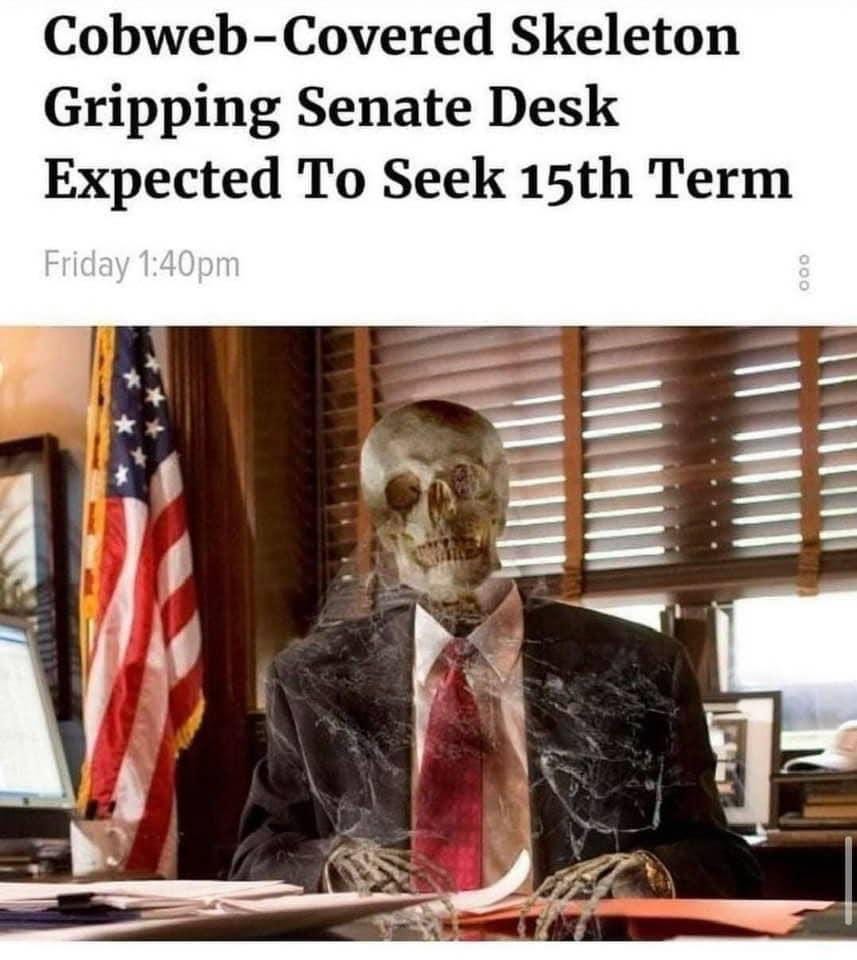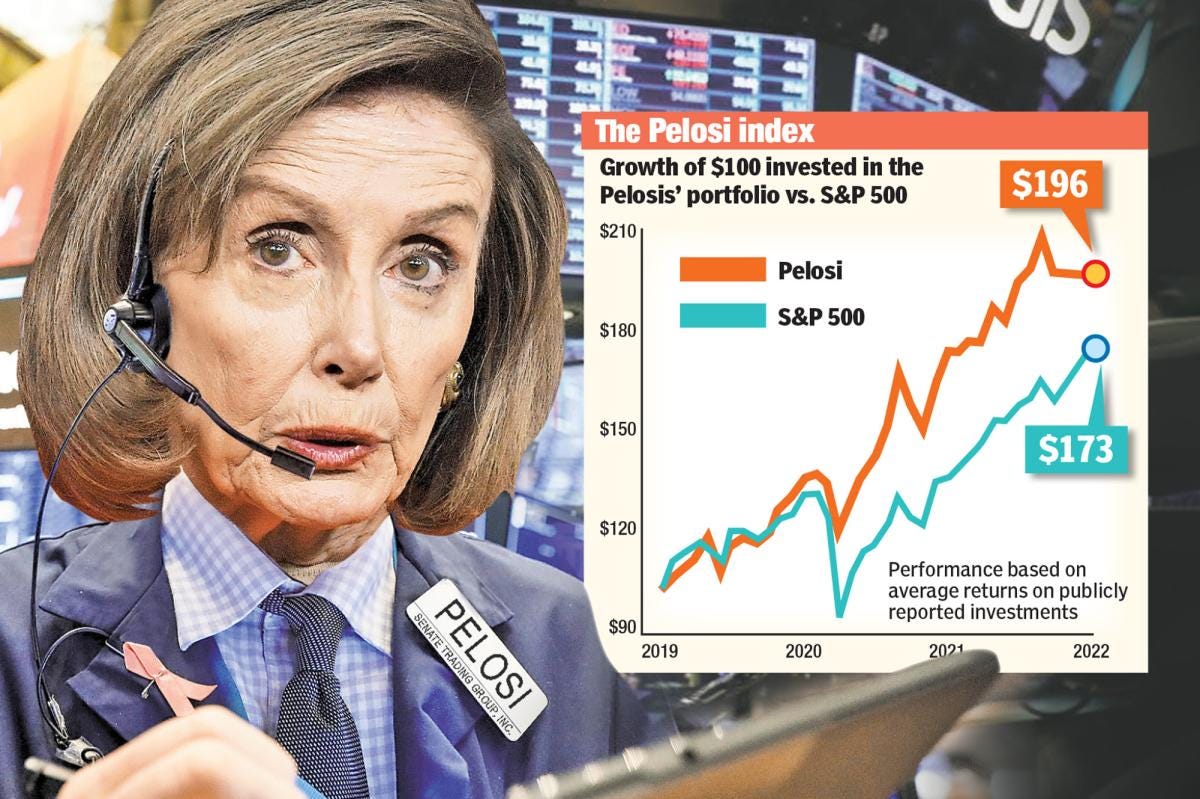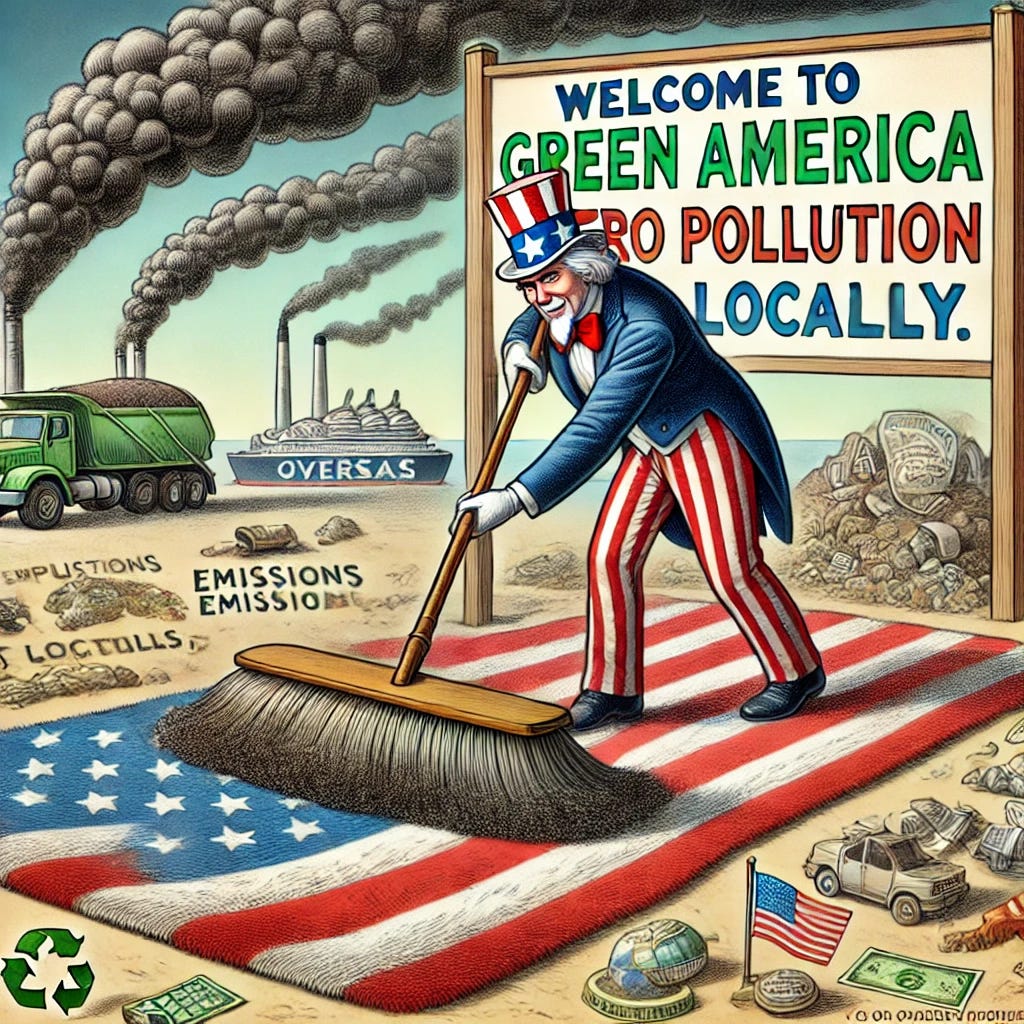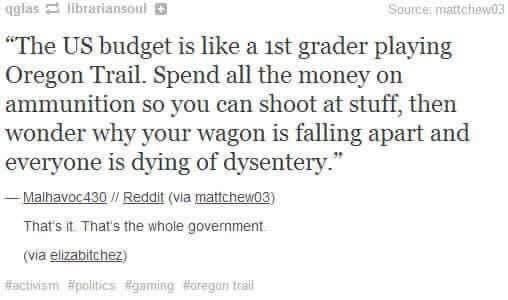Sanity and Introspection in the Age of Political Dysfunction
Finding Clarity, Calm, and Constructive Action Amid Chaos
The Hardest Truths
The hardest truths to accept are the ones that demand something of us. It’s easier to see failure as something that happens to us rather than something we’ve contributed to or enabled. But avoidance has a cost—it leaves problems unresolved and allows dysfunction to persist. Whether in our personal lives or in the systems that govern us, real change begins when we look inward first.
Last year, I personally experienced the complexity of this truth. Heading into the summer, I was in the strongest place I had been in years—emotionally balanced, professionally thriving, and genuinely happy. I'd achieved difficult goals through therapy, meditation, and self-work, and I was dating someone I was deeply excited about. Everything felt like sunshine and rainbows. Fast forward to the end of October and the relationship abruptly ended. Admittedly, this turn of events was something I was deeply sad about but it wasn’t exactly a life shattering event. Little did I know that it was just the first of a chain of unrelated events so tragic they felt almost Shakespearean: my mother nearly dying from illness and spending months in the hospital, a serious leg injury that left me immobile and housebound, professional setbacks, a couple of 5-6 figure trade fumbles, and a cascade of other misfortunes that are not meant for public consumption. Initially, I comforted myself with the narrative that these post break-up misfortunes were external tragedies—unlucky events entirely beyond my control. While mostly but not entirely true, this became an excuse to avoid introspection. Early on, I even complained to my therapist that the worst part was there seemed to be no lessons, nothing constructive to take away—just pure, senseless misfortune.
But as the initial shock faded, I eventually saw uncomfortable truths emerge. Though I couldn't have prevented the tragedies, I had missed clear signs that cracks were forming in my resilience long before the darkness set in. In the rush of success followed by new romance, I had let foundational practices slip—meditation, regular reflection, personal discipline, social structures and interactions—all essential for keeping me stable and effective. This led to initiatives left unattended that I was unwittily turning into ticking time bombs and misassigned anger fueling disproportionate responses. My focus had become narrow in a unproductive way, which had ironically made me a worse participant on the things I was focusing on. Had I maintained these habits, the tragedies would still have been painful, but my ability to cope and adapt would have been significantly stronger. My avoidance of introspection delayed healing and growth.
This personal realization highlights an uncomfortable but critical truth: even when external attribution or blame is justified, that doesn't absolve us from introspection. Just because something isn't our fault doesn’t mean there aren’t lessons to learn, ways to improve, and some amount of responsibility to take for our own actions. If even someone who consciously values introspection could fall prey to this, imagine how easily this happens on a societal scale, particularly in emotionally charged political contexts where introspection muscles are rarely developed at all.
Discomfort isn’t always a warning—it’s often the first step toward growth. Our political culture, however, has perfected external blame, obscuring the structural dysfunction that created our problems. Outrage fuels engagement. Blame reinforces division. But neither repairs the crumbling foundation beneath us.
The 2024 election wasn't just about Trump’s strengths—it was about Democratic weaknesses. In 2020, Biden received 81.3 million votes. In 2024, Harris received only 75 million. That’s 6 million missing votes—and they didn’t just vanish.
At least 2 million former Biden voters switched to Trump, evident from down-ballot Democratic wins and abortion referendums passing in states Trump won. Another 4 million simply stayed home, unmotivated to turn out for the alternative.
Trump may be uniquely gifted politically, but that's not the main reason he won. The defining question isn't, “How could people vote for Trump?” It’s “Why was the alternative so unappealing?”
Democratic Dysfunction: Defending Rules, Ignoring Outcomes
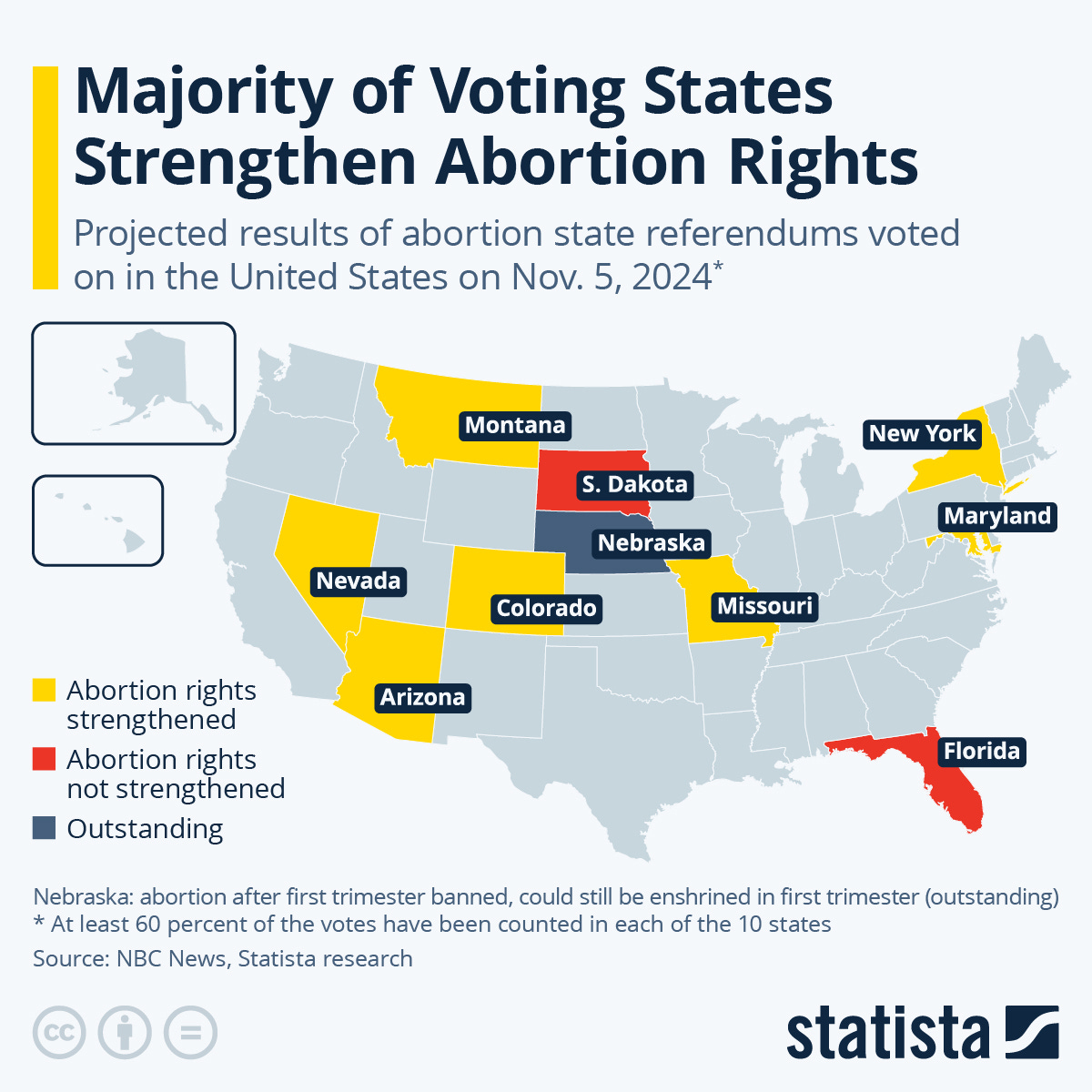
It’s tempting—and comfortable—for liberals to frame the 2024 election purely around Trump’s chaos. Yet, doing so sidesteps a crucial point: Trump’s return wasn’t inevitable; it was enabled by the Democratic Party’s stubborn refusal to face reality.
Over the past decade, Democrats have increasingly become defenders of rules and institutions—not because they deliver beneficial outcomes, but simply because "those are the rules." The party seems more concerned with preserving appearances of stability than achieving real, measurable progress. Every election cycle brings ambitious proposals, but rarely does anyone stop to ask: “Are we actually getting value from what we’ve already done?” Instead, the approach is always the same—more rules, more complexity, more programs that sound good in speeches but deliver little tangible benefit. Even when mission-critical and necessary packages are passed, the CHIPS and Science Act being a prime example, little thought was given to timely and effective deployment. The CHIPS Act passed in August of 2022 and spoiler alert, projects are behind nearly across the board and a large portion of the funding allocated remains undeployed.
This dynamic reached its apex when Biden—who explicitly promised to serve only one term as a transitional figure—chose instead to run again. Understandably, voters had profound concerns . Polls consistently reflected deep unease with Biden’s age, viral clips highlighted his cognitive struggles, and troubling public speeches amplified widespread anxiety. Democrats didn’t just ignore these concerns—they actively gaslit anyone who raised legitimate questions, dismissing them as unserious or partisan attacks. Then the disastrous debate performance laid bare what we all knew for a long time, Biden had declined to an unacceptable degree and needed to step aside.
Unfortunately, by the time he finally dropped out, the general election was mere months away, making a meaningful primary impossible. Biden’s late withdrawal effectively handed Kamala Harris the nomination without voter input. Harris, notably unpopular even within her own party, had performed disastrously in the 2020 primaries, dropping out before a single vote was cast. Yet Democrats, in the name of "defending democracy," now asked voters to rally behind a candidate nobody had chosen.
Party leadership justified Harris’s candidacy with two flawed arguments: first, that funds already raised for Biden could only be transferred if Harris became the nominee, and second, that she alone possessed sufficient national name recognition. Both claims were transparently false. After Harris was chosen, Democrats raised an additional $1 billion—the largest sum ever raised in such a short period—only to squander it spectacularly. And rather than being a strength, Harris’s national name recognition was a clear liability. If Democrats truly believed Trump posed an existential threat, why not choose either of the popular and highly competent Democratic governors—Gretchen Whitmer of Michigan or Josh Shapiro of Pennsylvania? Both had recently won elections (Whitmer decisively so, twice), each represented key swing states that Biden had narrowly won in 2020 and Harris disastrously lost in 2024, and both appealed broadly to demographics critical at the national level.
The implicit message to voters was clear: “Trust us, or you're enabling Trump.” or “Voting for us is the only way to protect women’s rights” (even though it was our fault they were at risk in the first place). But voters needed more than fear-based messaging. With rising inflation, economic anxiety, and a sense the party in power wasn't delivering improvements, voters asked practical questions: “What will you actually do to make things better?” Democrats responded largely by doubling down on niche social issues or reverting repeatedly to “Trump is dangerous,” neither of which addressed voters' real anxieties—housing, groceries, healthcare, inflation, illegal immigration, and economic stability.
We can criticize Trump endlessly—often rightly so—but moral outrage alone won't fix the underlying rot. This wasn't just a grave tactical error; it was a fundamental misunderstanding of what motivates voters, highlighting a profound disconnect between party leaders and everyday realities. Those 6 million missing votes weren't Republicans; they were frustrated Democrats and Independents feeling unheard, unseen, and unrepresented.
The bridge Democrats keep asking voters to cross was collapsing beneath their feet, yet party leadership stubbornly insisted nothing was fundamentally wrong. Instead, they blamed it on a communication issue, convinced voters simply didn’t understand all the good things Democrats supposedly had done—good things voters weren’t feeling precisely because the systems weren't effectively serving their needs. Until Democrats honestly confront their dysfunction, voters will continue turning toward candidates like Trump, who at least acknowledge their struggles and even accurately diagnose some of the flaws in our system—even if solutions remain elusive.
The Outrage Machine: Media Dysfunction and Manufactured Anger
Democratic dysfunction didn't occur in isolation; it was amplified and enabled by an increasingly sensationalist media landscape. The political media ecosystem thrives on outrage and fear, driven by algorithms that reward anger and conflict above nuance and depth. Cable news and social media aren’t designed to inform—they provoke, monetizing anxiety and outrage.
A striking example of media distortion involves their coverage of Trump's rallies. On cable news, you'd assume these events consist entirely of outrageous and inflammatory rhetoric. Having forced myself to watch many hours of Trump’s rallies—yes, hours I'll never get back—I found about one-third is indeed as wild as portrayed. However, about two-thirds genuinely resonate with voters, addressing real anxieties about inflation, job security, manufacturing, illegal immigration, and economic stability. Will Trump actually deliver on these promises? Probably not. But he was speaking the language voters desperately wanted and needed to hear—something Democrats consistently failed to do.
Even more troubling is that from time to time, mainstream outlets exaggerated or distorted Trump's words—an astonishing and unnecessary choice, given that Trump provides an abundance of genuinely alarming statements. When voters repeatedly see media claims exposed as exaggerated or distorted, it doesn't merely discredit a single story; it erodes trust in the media as a whole. This erosion of trust ultimately makes legitimate criticism harder to land, weakening the ability to hold Trump accountable effectively.
Exaggeration doesn't just fuel distrust; it undermines democracy itself by making genuine accountability almost impossible. In the end, sensationalism benefits no one but the media companies profiting from our collective outrage.
Sanity Strategy: Disconnecting to Reconnect
Understanding the problems we've laid out—Democratic dysfunction, media-driven outrage, structural rot—is important, but knowledge alone won't fix them. Meaningful engagement requires emotional clarity and sanity, something increasingly difficult to maintain amidst the constant flood of sensationalist news and polarized discourse. To be part of the solution rather than inadvertently perpetuating the dysfunction, we must periodically disconnect from outrage media and reconnect with our emotional equilibrium.
Let me illustrate why this matters on a personal level. I'm someone who actively prioritizes thoughtful dialogue. I enjoy engaging earnestly with perspectives different from my own, partly because persuasion only happens through meaningful conversation, but also because it creates an opportunity to learn how someone else arrived at their perspective. Sometimes it sharpens your own arguments; sometimes it even changes your mind. At a minimum, it should shift your perspective, if only slightly. Yet recently, I found myself falling into exactly what I criticize—reacting reflexively, dismissively, and emotionally rather than strategically.
Last summer I was at a social gathering where I met a lot of the friends of the woman I was dating at the time for the first time. I went into the dinner stressed and frayed for reasons completely unrelated to politics. One of said friends mentioned doing a lot of volunteering in RFK Jr.’s presidential campaign and once he found out what I did for work, he pushed farther into talking about politics, which was the last thing I wanted to do. He made a lot of claims about everyone in government being bad even though I said that which somewhat true, it’s not everyone, I am friends with a lot of good, talented peopled working in government. Now granted, going deep into politics with someone you’re meeting for the first time is a bold choice, especially when they push hard on some of your favorite people sucking. Under normal circumstances though, this is a situation where I love to engage with curiosity. However, my internal reaction was immediate, reflexive, and negative. To be clear, our interaction wasn't overtly hostile, but I let it form a far too decisive assessment of someone with far too little information (see also: not my normal vibe). However, the real mistake was afterward: when alone with the woman I was dating, I unnecessarily declared, "I like all your friends except one." Understandably, she was upset—it was the first time I had met most of them. The real damage here wasn't a political disagreement—it was that my unrelated emotional stress bled into a personal interaction, causing avoidable harm. It’s always easy to assign external blame than to look withing and something highly activating like politics becomes an easy destination.
Months later, the emotional residue from that first interaction clouded a second chance. The same friend had shifted from RFK Jr. to Trump. He went to a Trump rally and it wasn’t what he expected (which at this point, I had also had some exposure to). After this experience he wanted to start a podcast focused on discovering how people find their political truths. He sought career advice from the woman I was dating, as she had hosted a successful podcast in the past. She was clearly excited to tell me and even though normally the kind of endeavor he was proposing is exactly the sort of thing I like to encourage, my initial reaction wasn’t. Instead, lingering negativity from our first meeting triggered another dismissive response. Politically, this reaction ignored a valuable opportunity to connect with someone undergoing genuine political introspection. Personally, it was hurtful and damaged trust with someone I cared about.
This isn't just personal reflection—it's a cautionary tale. If I, someone actively mindful of productive engagement and emotional clarity, could so easily slip into unproductive dismissiveness due to unrelated stress, imagine how quickly emotional reactivity escalates when explicitly fueled by outrage media and politically charged discourse.
Disconnecting from outrage media is particularly critical now, given Trump's deliberate strategy of "flooding the zone." Trump is uniquely gifted at tapping into a crowd’s immediate mood or the zeitgeist broadly. At that moment, he genuinely believes what he's saying—it's precisely why people find him compelling. Yet, these moments rarely translate into stable, consistent policy actions. The nuance between momentary statements and sustained action is completely absent from news alerts, creating an overwhelming feeling of constant crisis. When every headline screams that the sky is falling, your clarity disappears, and emotional burnout takes hold.
Of course, some of Trump's promises will materialize—and often in harmful ways. But here’s an uncomfortable truth: not everything will be a crisis. Some actions may even prove beneficial or at least less harmful than anticipated. You’d never know this by scanning headlines. Worse yet, obsessively following news developments is mostly futile. The battle to prevent Trump’s presidency is over, and there’s no cohesive Democratic response in place anyway. So why exhaust yourself emotionally when there’s little you can immediately do?
Another critical aspect of disconnecting and regaining clarity involves recognizing and actively avoiding counterproductive behaviors masquerading as persuasion—especially on social media. Too often, posts opposing Trump come across as condescending or scolding rather than genuinely persuasive. Statements like, "If you had a serious problem, would you ask a billionaire and a 19-year-old to solve it?" or, "Do you really think a heroin addict with zero experience should run healthcare?" fundamentally misunderstand the other side’s perspective. Condescending memes and scolding posts persuade no one; they only harden defensive reactions and entrench divisions further.
It’s tempting to assume your position is self-evident, that anyone disagreeing must be misinformed or unintelligent. But people see issues differently—not necessarily because they're uninformed, but because they prioritize differently or have access to different information. Condescending memes and scolding posts persuade no one; they only harden defensive reactions and entrench divisions further. Worse, this tactic risks alienating moderates or people genuinely open to engagement and understanding. If you simply need to vent privately, that's understandable. But let’s stop pretending public scolding or outrage-fueled rants on social media achieve anything but division. These actions don't change minds; they poison conversations and reinforce divides.
Yet many still feel an overwhelming urge to "do something." The helplessness or perceived negligence of stepping away can feel irresponsible. But the truth is, the best thing you can do right now is focus on your personal development and strengthen bonds with those around you. This is the ideal moment to adopt or reinforce positive personal habits. Start or deepen a meditation practice—emotional clarity and self-awareness are powerful antidotes to anxiety and outrage. Exercise regularly; you'll look better, feel better, and become healthier, benefiting yourself and those around you. Pursue enriching activities—join a sport, try improv, explore new hobbies, volunteer, read books, arm yourself with knowledge. Building yourself up personally not only helps you but also positively influences your community. It prepares you for meaningful engagement down the road.
If you absolutely must engage with news, avoid cable news or video altogether—these mediums deliberately amplify emotional intensity. Instead, use tools designed explicitly for media literacy and efficiency. My personal favorite is Ground News.
Ground News is a news aggregation platform built to counteract polarization and bias. It compiles coverage from thousands of sources—left, center, right, and international—giving you a structured comparison of how different outlets frame the same story. Each story clearly marks the political leanings of the reporting sources, and Ground News even flags "Blindspots"—topics disproportionately covered by one political side. Its factuality ratings, backed by third-party assessments, ensure you can quickly identify reliable coverage.
Why does this matter? Because Ground News makes it possible to escape your ideological echo chamber, reducing exposure to sensationalist, outrage-driven coverage. It enhances your media literacy by making biases transparent, and it allows you to quickly see if multiple credible sources corroborate a claim, protecting you from misinformation. It’s the opposite of cable news' emotional intensity: efficient, balanced, and clarifying.
In short, if we genuinely want to build something better, we must first regain emotional clarity and sanity. Before engaging, step back. Disconnect to reconnect. Use better tools. Your arguments will be sharper, your empathy deeper, and your effectiveness infinitely greater.
Structural Reforms: Fixing the System, Not Just Symptoms
Trump did not create the systemic issues we face, nor will he fix most of them—but we'd be intellectually dishonest to deny he’s accurately identified many underlying flaws in our political system. Much of his most unsavory behavior isn’t radically different from the status quo; he just says the quiet part out loud. The real work isn’t removing Trump—it’s repairing the broken systems that made him possible. Here’s how we start:
Updating Section 230: Accountability in the Age of Algorithmic Serving
An essential yet often overlooked component of structural reform involves revisiting Section 230 of the Communications Decency Act. Enacted in 1996, Section 230 provides legal immunity to internet platforms from liability for content posted by their users. This law, intended to support a burgeoning internet, helped enable today's vast digital ecosystem, protecting free speech and encouraging the rapid growth of digital communication and innovation.
However, the digital environment today is fundamentally different than the world that existed in 1996. The original law could not have anticipated the rise of sophisticated algorithmic content curation used by platforms like Facebook, Twitter, and YouTube. Originally, platforms simply displayed user-generated content chronologically or according to basic filtering rules. Today, powerful algorithms decide what content users see—prioritizing posts that maximize engagement, often through sensationalism, outrage, or controversy.
Algorithmic serving isn't neutral; it's editorial. When a platform actively chooses content to promote based on engagement metrics, it becomes an editor of information—albeit one driven by profit and opaque, proprietary algorithms. Yet Section 230 still shields these platforms from accountability for editorial choices they actively make. This creates a toxic dynamic: platforms reap massive profits from inflammatory content without responsibility for its broader societal impacts.
We shouldn’t abandon Section 230 entirely—its foundational principles remain valuable, allowing smaller platforms and new innovators to operate without crippling liability risks. But large platforms deploying powerful engagement algorithms should no longer be shielded completely. When content is algorithmically prioritized, promoted, or recommended in non-transparent ways, platforms become editors, making explicit decisions about visibility and consumption. In such cases, platforms must bear some responsibility for the content they choose to amplify and profit from.
Reforming Section 230 would need nuance, of course, carefully crafted to ensure it doesn't disproportionately harm smaller outlets or independent creators. However, thoughtfully implemented reform can create accountability and transparency around algorithm-driven content distribution—essential for reducing polarization, misinformation, and societal harm.
This isn't just a minor policy update; it's a critical step toward a healthier political and social landscape. If we're serious about addressing the deeper dysfunction fueling candidates like Trump and the polarization that divides us, we must honestly confront how modern media algorithms shape public discourse—and update our laws to reflect this reality.
Ranked-Choice Voting: How It Works and Why It Matters
Ranked-choice voting (RCV) fundamentally reshapes electoral incentives by allowing voters to rank candidates in order of preference rather than choosing just one. Here's how it works: voters list candidates in order of preference—first choice, second choice, third choice, and so on. When votes are initially counted, if no candidate receives a majority of first-choice votes, the candidate with the fewest first-choice votes is eliminated. Voters who ranked that candidate first have their votes reassigned to their second-choice candidate. This process continues until one candidate achieves a clear majority.
RCV has already been successfully implemented in various state and local elections, notably in Alaska, Maine, and cities such as New York, San Francisco, Minneapolis, and Oakland. The results have shown increased voter satisfaction, reduced negative campaigning, and higher turnout. Third-party and independent candidates become viable, encouraging a broader, more representative political spectrum. Candidates are incentivized to appeal to wider coalitions, reducing polarization and shifting focus toward solutions rather than divisive rhetoric.
Primary Election Reform and Election Access
All primaries for national elections in every state should happen on the same day. States like Iowa, New Hampshire, and South Carolina are not broadly representative of national voter demographics. The fact that they have an outsized influence on who our candidates for president are is preposterous.
Election day should be a federal holiday, full stop. Swap it for Presidents Day, it’s what the cool ones would have wanted anyway.
Stop fighting the difficult battle of voter id laws. Just make it easier for everyone to get an id.
Term Limits & Public Campaign Financing
Term limits ensure a steady influx of fresh ideas and perspectives, preventing entrenched power and inevitable corruption. While institutional knowledge matters, it can quickly turn into institutional stagnation without regular turnover. Term limits maintain urgency, freshness, and connection to voter realities.
Public campaign financing addresses the corrosive influence of money in politics. Politicians currently spend far more time courting wealthy donors than serving constituents. Public financing frees candidates from reliance on corporate and special-interest money, ensuring they remain accountable to voters.
Increasing Congressional Salaries & Banning Active Trading
Alongside public financing, we should significantly increase salaries for congressional and senate representatives. Currently, base salaries hover around $195,000—not much for living comfortably in Washington, D.C. Public service shouldn't require financial sacrifice, as this discourages talented individuals from running and makes officeholders more vulnerable to corruption. At these low salary levels, representatives become susceptible to influence from special interests or are forced to leverage privileged information to increase their own wealth.
Significantly raising congressional salaries will attract and retain the best and brightest talent, regardless of their preexisting wealth. This adjustment ensures public office is accessible to talented individuals who would otherwise face choosing between public service and significantly higher private-sector incomes.
Simultaneously, we must ban the active trading of equities by members of Congress and their immediate families. It's no secret that copying certain lawmakers' portfolios significantly outperforms the stock market—effectively, insider trading in public view. Members of Congress should be required either to convert their investments into index funds, place them in a blind trust, or fully divest before assuming office. These measures will substantially reduce conflicts of interest and ensure that privileged information isn't exploited for personal enrichment.
Reducing Regulatory Bloat—Efficient Doesn’t Mean Reckless
America has become notoriously slow, expensive, and difficult for infrastructure and manufacturing projects due to excessive regulation. Some regulation is essential, but overly restrictive rules drive businesses overseas to countries unconcerned with emissions or human rights. Ironically, excessive domestic regulation can increase global environmental harm by offshoring pollution. Strategic domestic manufacturing—even if slightly short of ideal environmental targets—is preferable to overseas production with lower standards.
Smarter regulation involves balancing realistic standards with economic viability. Short-sighted decisions—like not burying power lines because of upfront costs—ignore billions in recurring storm-related damages. Holistic cost-benefit analyses must become standard, considering immediate and long-term implications equally.
Building a Government Program Accountability Apparatus
Finally—and perhaps most crucially—we need a permanent, non-partisan apparatus tasked with regularly evaluating the effectiveness of government programs. Many programs start as effective solutions but degrade under bureaucratic bloat, becoming expensive, inefficient, or actively harmful over time. We rarely reassess these programs, instead layering new initiatives onto ineffective ones, increasing costs while delivering diminishing returns.
Regular assessments must measure each program’s return on investment—economic, societal, and preventative. Some programs will deliver immediate economic benefits; others improve societal well-being or prevent future crises. Consider healthcare: doctors primarily earn by treating illnesses, creating perverse incentives. Instead, we should incentivize prevention, rewarding doctors for keeping people healthy. A healthier population isn't just happier; it's economically resilient, free from crippling medical debt.
Whether this means revamping the only forward looking agency with less enforcement ability than the UN that is the Congressional Budget Office or creating something net new, I’m not sure but what I am sure of is that what we’re doing now is not working.
The Real Debate: Smarter Government, Not Bigger or Smaller
We must reject the false binary of "big government versus small government." Size is irrelevant. What matters is smarter, more efficient, accountable governance. The question isn't "more or less government"—it's "better government." Better government regularly evaluates, refines, and improves initiatives, retaining successful programs and eliminating failures. This cycle of continuous improvement is foundational to lasting change.
The Bigger Fight: Beyond Trump, Toward Lasting Change
Trump’s return to power isn’t merely an anomaly—it’s the direct consequence of systemic failures we've collectively enabled or ignored. Outrage and moral indignation alone won't change our trajectory. Trump is not the disease; he’s a symptom of deeper, chronic dysfunction.
Even if Harris had won, we would merely have delayed the inevitable. The structural cracks in our democracy had already deepened past the point of superficial repair; the rot had become too entrenched, and Democratic leadership had grown dangerously out of touch. The system didn't just break—it needed to break. It's tragic that it happened under such unfavorable circumstances, but it was inevitable nonetheless.
Yet as unsettling as this moment feels, it isn’t unprecedented. American democracy has weathered deep crises before and will again. Society isn’t crumbling, even if it feels that way. Instead, we stand at a critical inflection point: a moment not for despair, but for decisive introspection, clear-eyed action, and meaningful reform.
The work ahead is immense. It involves structural changes like ranked-choice voting, term limits, public campaign financing, increased accountability, smarter regulations, and more effective governance. Equally vital, it requires each of us to learn once again how to talk to one another across divides, engage with good faith, and embrace uncomfortable truths about our roles in creating—and fixing—the dysfunction.
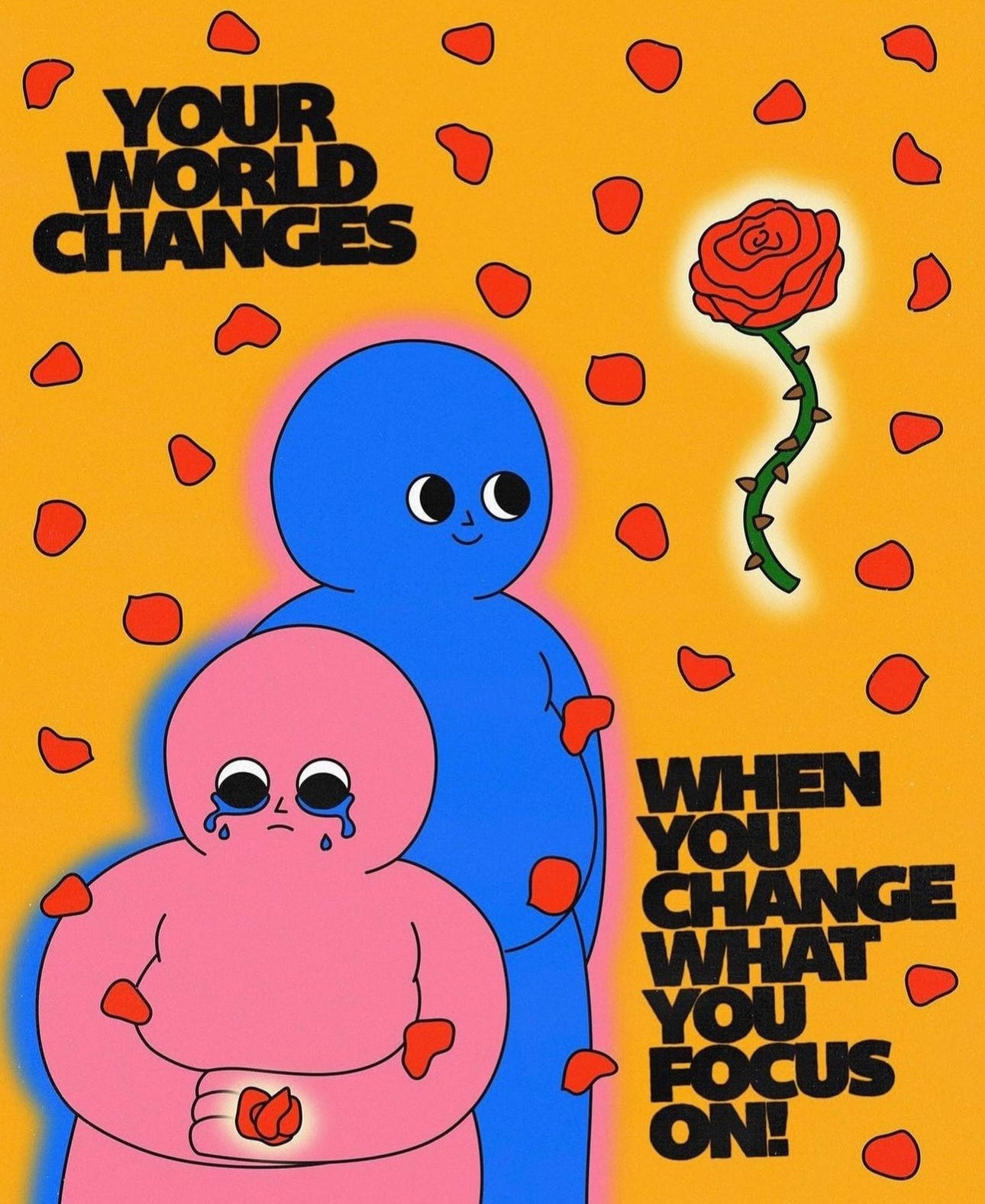
We are still in the early innings and I already see so many of you close to burnout. This is not the way. Now is the time to refocus energy inward. Disconnect from algorithm-driven outrage and reclaim your emotional clarity. Strengthen bonds with family, friends, and community. Develop new habits that foster personal growth and resilience. Meditate, exercise, volunteer, or engage in enriching activities. Doing so isn't irresponsible; it's essential. A stronger, healthier you is foundational to meaningful civic participation and long-term change.
The true fight isn’t merely against Trump or any single political figure. It's against the failing systems, entrenched divisions, and eroded trust that allowed him to thrive. But systems don’t fix themselves, and democracy won't repair on outrage alone.
So take this moment to breathe. Disconnect for a while—you've earned it. Focus inward and build yourself up first. It might feel irresponsible, but I promise it isn’t. Take this time to focus on you, babe. We could all benefit from putting our personal houses in order before beginning the long and arduous journey of repairing our collective home. The challenge ahead is significant—but so, too, is our capacity for renewal, resilience, and lasting change as long as we don’t forget to first tend our own garden.
Take care of yourself out there, and if you can, someone else too.










